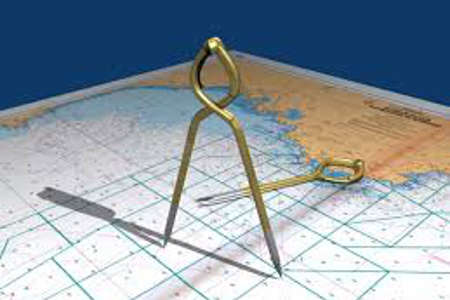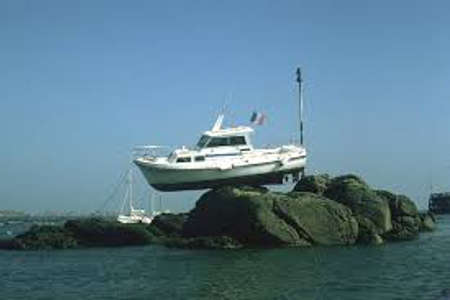In France, as in England, it is possible to practice sailing without obtaining a license.
Considering the weight-to-power ratio of an ultra-light hull equipped with an outboard motor, it is possible to reach dangerous speeds for oneself and others in case of a collision.
This is not really the case for cruising sailboats, which are generally equipped with slow inboard diesel engines designed as auxiliaries to the primary propulsion mode: the sail. Moreover, a sailboat is naturally limited by its hull speed due to its keel or centerboard. Using a motor on a sailboat is therefore not considered an obstacle to navigation.
The paradox is that the knowledge required to maneuver a sailboat is greater than that needed to operate a motorboat... Fortunately, people don’t typically head out to sea on a sailboat without some preparation. Nevertheless, the debate over the necessity of obtaining a license to operate a sailboat regularly surfaces among boaters.
Sailing schools, however, generally do a good job of preparing future boaters to handle a sailboat. Those who wish to learn to maneuver a sailboat can easily combine coastal and offshore licenses with sailing courses. This approach provides a more comprehensive introduction to navigation and avoids skipping steps through the validation of levels accredited by the French Sailing Federation.
In practice, a charter company renting out cruising sailboats usually requires a nautical CV from the prospective renter.
In this regard, it is dangerous to underestimate the risks involved in renting a sailboat without mastering the basics of maneuvering under sail and engine. While rental companies are always keen to do business, accidents resulting from a lack of navigation knowledge are attributed to the charter company, which insurance companies are quick to exploit... Hence the importance of taking out a deductible buy-back policy!


In France, operators of boats equipped with an outboard motor with a power greater than 6 horsepower must hold a coastal license.
This license allows navigation up to 6 nautical miles from shelter (about 10 kilometers), day and night, with no power limit. It is possible to obtain the coastal license in coastal areas as well as on rivers.
Beyond 6 nautical miles from shelter, legislation requires obtaining the offshore license. This license allows navigation without distance or power constraints, day and night. Essential for motorboat enthusiasts, the educational program is, of course, more ambitious than its coastal counterpart.
It includes more advanced navigation exercises on charts to be able to plot a course, calculate drift caused by wind or current, perform estimated positioning, or determine position manually or electronically.
The techniques studied for the offshore license are equally applicable to sailing, making it valuable for those wishing to quickly acquire solid theoretical foundations in cartography.
Finally, the Restricted Radiotelephone Operator Certificate (or CRR, Short Range Certificate SRC) is mandatory for the use of a VHF (Very High Frequency) radio.
These devices allow communication with other boats, recreational sailors, or commercial ships, as well as sending and receiving important navigation messages. The CRR is therefore essential for understanding the various safety or emergency call procedures, as well as the international alphabet.
In France, as in England, it is possible to practice sailing without obtaining a license.
Considering the weight-to-power ratio of an ultra-light hull equipped with an outboard motor, it is possible to reach dangerous speeds for oneself and others in case of a collision.
This is not really the case for cruising sailboats, which are generally equipped with slow inboard diesel engines designed as auxiliaries to the primary propulsion mode: the sail. Moreover, a sailboat is naturally limited by its hull speed due to its keel or centerboard. Using a motor on a sailboat is therefore not considered an obstacle to navigation.
The paradox is that the knowledge required to maneuver a sailboat is greater than that needed to operate a motorboat... Fortunately, people don’t typically head out to sea on a sailboat without some preparation. Nevertheless, the debate over the necessity of obtaining a license to operate a sailboat regularly surfaces among boaters.
Sailing schools, however, generally do a good job of preparing future boaters to handle a sailboat. Those who wish to learn to maneuver a sailboat can easily combine coastal and offshore licenses with sailing courses. This approach provides a more comprehensive introduction to navigation and avoids skipping steps through the validation of levels accredited by the French Sailing Federation.
In practice, a charter company renting out cruising sailboats usually requires a nautical CV from the prospective renter.
In this regard, it is dangerous to underestimate the risks involved in renting a sailboat without mastering the basics of maneuvering under sail and engine. While rental companies are always keen to do business, accidents resulting from a lack of navigation knowledge are attributed to the charter company, which insurance companies are quick to exploit... Hence the importance of taking out a deductible buy-back policy!


In France, operators of boats equipped with an outboard motor with a power greater than 6 horsepower must hold a coastal license.
This license allows navigation up to 6 nautical miles from shelter (about 10 kilometers), day and night, with no power limit. It is possible to obtain the coastal license in coastal areas as well as on rivers.
Beyond 6 nautical miles from shelter, legislation requires obtaining the offshore license. This license allows navigation without distance or power constraints, day and night. Essential for motorboat enthusiasts, the educational program is, of course, more ambitious than its coastal counterpart.
It includes more advanced navigation exercises on charts to be able to plot a course, calculate drift caused by wind or current, perform estimated positioning, or determine position manually or electronically.
The techniques studied for the offshore license are equally applicable to sailing, making it valuable for those wishing to quickly acquire solid theoretical foundations in cartography.
Finally, the Restricted Radiotelephone Operator Certificate (or CRR, Short Range Certificate SRC) is mandatory for the use of a VHF (Very High Frequency) radio.
These devices allow communication with other boats, recreational sailors, or commercial ships, as well as sending and receiving important navigation messages. The CRR is therefore essential for understanding the various safety or emergency call procedures, as well as the international alphabet.